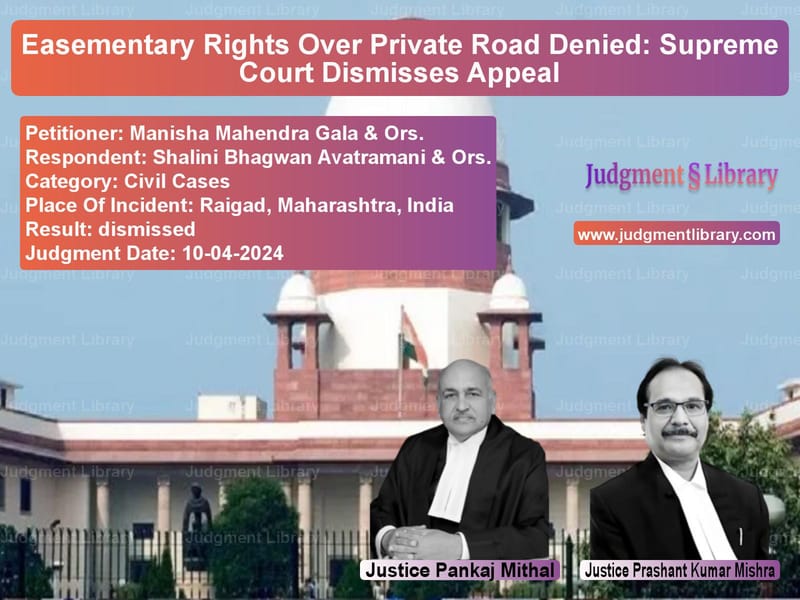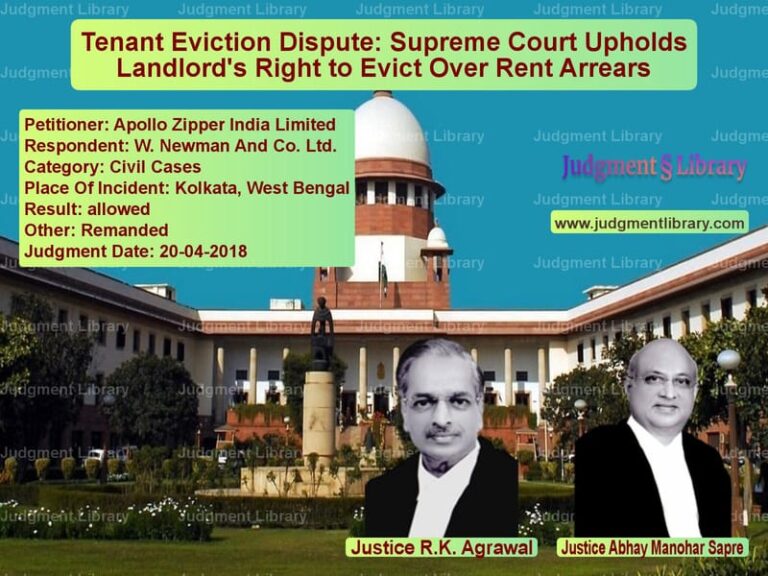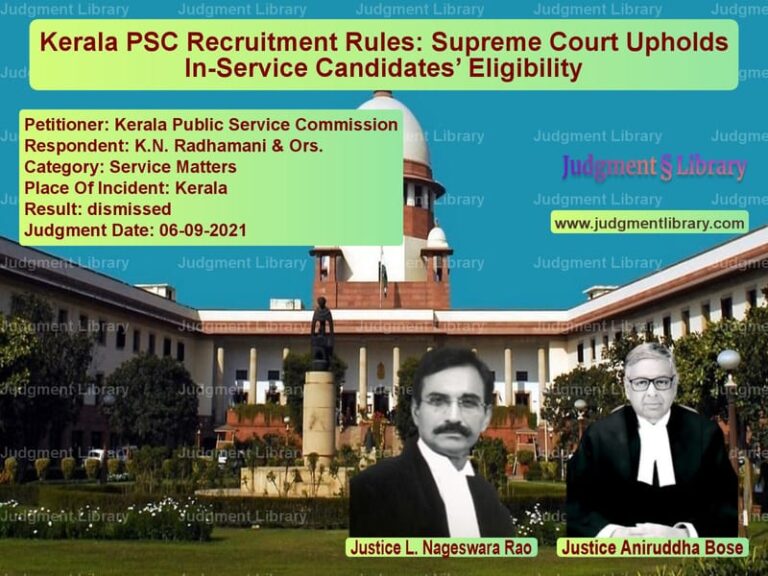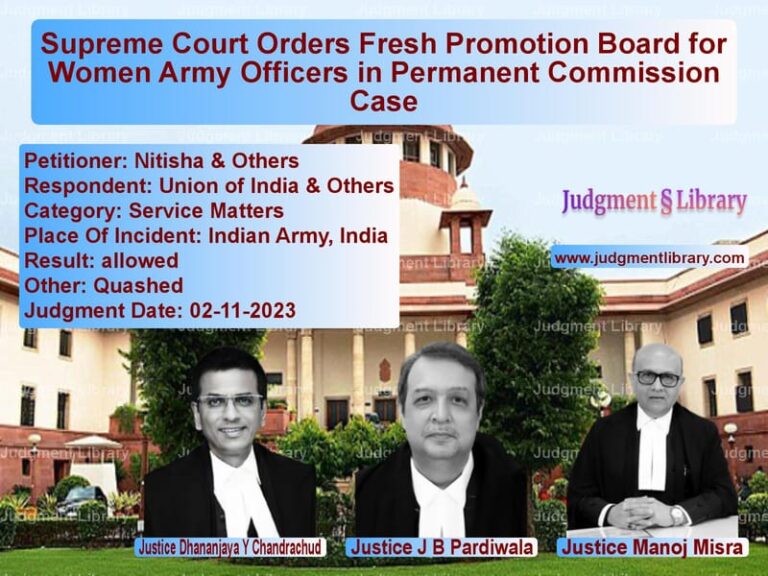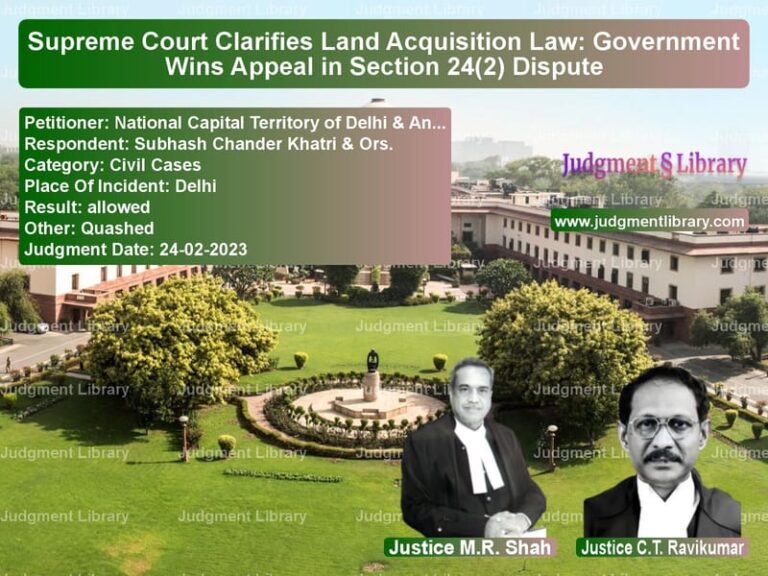Easementary Rights Over Private Road Denied: Supreme Court Dismisses Appeal
The Supreme Court of India recently delivered a significant judgment in the case of Manisha Mahendra Gala & Ors. vs. Shalini Bhagwan Avatramani & Ors., addressing the issue of easementary rights over a disputed 20-foot-wide private road. The case revolved around whether the appellants (Gala family) had acquired a right of way over land owned by the respondents (Ramani family) through easement by prescription or easement by necessity.
Background of the Case
The dispute pertained to a 20-foot-wide road situated on Survey No.57 Hissa No.13A/1, which was owned by the Ramani family. The appellants, the Gala family, claimed that they had a right to use this road as an easement, either through prescription (continuous use for over 20 years) or by necessity (lack of an alternative access road).
The litigation began with two separate lawsuits:
- Suit No. 14 of 1994 – Filed by Joki Woler Ruzer, the predecessor of the Gala family, seeking a declaration of easementary rights over the disputed road and an injunction against the Ramani family from obstructing their access.
- Suit No. 7 of 1996 – Filed by the Ramani family, seeking a declaration that the Gala family had no legal right to use the road.
The trial court initially ruled in favor of the Gala family in 1994, granting them easementary rights. However, the appellate court overturned this decision in 2009, ruling in favor of the Ramani family. The Gala family then approached the Supreme Court.
Arguments by the Appellants (Gala Family)
- The Gala family argued that their property, Survey No. 48 Hissa No. 15, had no other means of access, making the disputed road their only route.
- They claimed that they had been using the road for over 20 years, fulfilling the legal requirements for easement by prescription.
- Their sale deed referenced an existing right of way, implying that such a right was transferred to them.
- The lower court’s decision in their favor should not have been overturned by the appellate court without strong evidence.
Arguments by the Respondents (Ramani Family)
- The Ramani family contended that the Gala family never had a legal right to use the road.
- There was no evidence proving uninterrupted use for 20 years before the filing of the suit.
- The Gala family had an alternative access route, nullifying their claim for easement by necessity.
- The sale deed relied upon by the Gala family was not admissible as it was only a photocopy, and no original document was produced.
Supreme Court’s Judgment
The Supreme Court dismissed the appeals, affirming the appellate court’s decision that the Gala family had no easementary rights over the disputed road.
Key Observations
- The Court ruled that easement by prescription requires continuous and uninterrupted use for over 20 years. The Gala family’s claims were vague and failed to meet this requirement.
- Easement by necessity applies only when there is no alternative access. Evidence showed that the Gala family had another way to reach their property, making this claim invalid.
- The Gala family failed to provide conclusive documentary evidence proving their claim.
- The sale deed presented by the appellants was a mere photocopy and was not admissible as evidence.
- The Power of Attorney holder who testified for the Gala family lacked personal knowledge of the land’s historical usage.
Final Order
- The Supreme Court upheld the 2009 judgment of the appellate court.
- The Gala family was restrained from using the disputed road.
- The Ramani family’s ownership and exclusive possession of the road were confirmed.
- Both appeals were dismissed with no further legal relief for the Gala family.
Legal Implications of the Judgment
This ruling has far-reaching implications for property disputes and easementary rights:
- Strict evidence requirements: Parties claiming easement by prescription must provide clear proof of uninterrupted usage for at least 20 years.
- Easement by necessity is not automatic: The existence of any alternative route negates the claim.
- Documentary evidence must be valid: Photocopies of documents without originals are inadmissible in court.
- Power of Attorney limitations: Testimony from a representative is insufficient if they lack firsthand knowledge.
- Reaffirmation of property rights: The case highlights that landowners cannot be forced to allow access without legal justification.
Conclusion
The Supreme Court’s verdict in Manisha Mahendra Gala & Ors. vs. Shalini Bhagwan Avatramani & Ors. reinforces the importance of evidence-based claims in property disputes. The ruling serves as a precedent for similar cases, emphasizing that easementary rights cannot be presumed and must be proven with concrete evidence. The judgment ensures that private property rights are protected and that claims based on weak or insufficient evidence do not override legally established ownership.
Petitioner Name: Manisha Mahendra Gala & Ors..Respondent Name: Shalini Bhagwan Avatramani & Ors..Judgment By: Justice Pankaj Mithal, Justice Prashant Kumar Mishra.Place Of Incident: Raigad, Maharashtra, India.Judgment Date: 10-04-2024.
Don’t miss out on the full details! Download the complete judgment in PDF format below and gain valuable insights instantly!
Download Judgment: manisha-mahendra-gal-vs-shalini-bhagwan-avat-supreme-court-of-india-judgment-dated-10-04-2024.pdf
Directly Download Judgment: Directly download this Judgment
See all petitions in Property Disputes
See all petitions in Landlord-Tenant Disputes
See all petitions in Specific Performance
See all petitions in Judgment by Pankaj Mithal
See all petitions in Judgment by Prashant Kumar Mishra
See all petitions in dismissed
See all petitions in supreme court of India judgments April 2024
See all petitions in 2024 judgments
See all posts in Civil Cases Category
See all allowed petitions in Civil Cases Category
See all Dismissed petitions in Civil Cases Category
See all partially allowed petitions in Civil Cases Category

